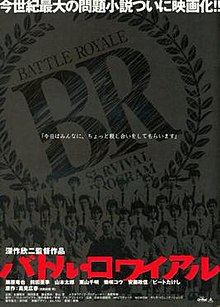| Battle Royale | |||||
|---|---|---|---|---|---|
 Theatrical release poster | |||||
| Japanese name | |||||
| Kana | バトル・ロワイアル | ||||
| |||||
| Directed by | Kinji Fukasaku | ||||
| Screenplay by | Kenta Fukasaku | ||||
| Based on | Battle Royale by Koushun Takami | ||||
| Produced by |
| ||||
| Starring | |||||
| Cinematography | Katsumi Yanagishima | ||||
| Edited by | Hirohide Abe | ||||
| Music by | Masamichi Amano | ||||
Production company | |||||
| Distributed by | Toei[1][2] | ||||
Release date |
| ||||
Running time | 113 minutes[3] | ||||
| Country | Japan | ||||
| Language | Japanese | ||||
| Budget | $4.5 million | ||||
| Box office | $30.6 million | ||||
Battle Royale (Japanese: バトル・ロワイアル, Hepburn: Batoru Rowaiaru) is a 2000 Japanese action film[4] directed by Kinji Fukasaku from a screenplay by Kenta Fukasaku, based on the 1999 novel of the same name by Koushun Takami. The film stars Tatsuya Fujiwara, Aki Maeda, Tarō Yamamoto, Chiaki Kuriyama, Kou Shibasaki, Masanobu Andō, and Beat Takeshi. It follows a group of junior high school students forced to fight to the death by a Japanese totalitarian government.
Battle Royale was theatrically released in Japan on December 16, 2000, by Toei, with an R15+ rating, which is rarely used in Japan.[5][6][7] The film drew controversy and was banned or excluded from distribution in several countries.[8][9] Toei refused to sell the film to any United States distributor for over a decade due to concerns about potential controversy and lawsuits, until Anchor Bay Films eventually acquired the film in 2010 for a direct-to-video release.[10] Worldwide, it grossed $30.6 million against a production budget of $4.5 million. The film earned critical acclaim and, especially with its video releases, drew a large global cult following. It is often regarded as one of Fukasaku's best films and one of the best films of the 2000s. In 2009, filmmaker Quentin Tarantino praised Battle Royale as his favorite film of the previous two decades.[11][12]
Battle Royale was the last film to be fully directed by Kinji Fukasaku. He started working on the sequel, titled Battle Royale II: Requiem, but died of prostate cancer on January 12, 2003, after shooting only one scene with Takeshi. His son, Kenta Fukasaku, who also wrote Requiem, completed the film that same year. The sequel was deemed inferior to its predecessor.
The film is notable for featuring many young, unknown actors who became stars later on, along with helping to spawn the battle royale genre.
- ^ a b "Battle Royale (2000)". British Film Institute. Archived from the original on March 22, 2016. Retrieved February 23, 2018.
- ^ a b Cite error: The named reference
variety_brwas invoked but never defined (see the help page). - ^ "Battle Royale". British Board of Film Classification. Retrieved May 10, 2021.
- ^ Cite error: The named reference
complexwas invoked but never defined (see the help page). - ^ Herskovitz, Jon (December 19, 2000). "The 'Battle' rattle". Variety.
- ^ Herskovitz, Jon (December 5, 2000). "Japanese pols target pic of violent youth". Variety.
- ^ Groves, Dan (November 28, 2000). "Japan sees 'Battle' over pic violence". Variety.
- ^ Garger, Ilya (June 30, 2003). "Royale Terror". Time. Archived from the original on March 5, 2007. Retrieved February 23, 2018.
- ^ Ito, Robert. "Lesson Plan: Kill or Be Killed." The New York Times. July 9, 2006.
- ^ Gray, Jason (November 25, 2010). "Toei continues strong sales on Battle Royale 3D". ScreenDaily.com. Archived from the original on October 2, 2018.
- ^ "'Battle Royale'". Quentin Tarantino's Top 20 Favorite Films. Xfinity. Archived from the original on April 18, 2012. Retrieved March 24, 2012.
- ^ Sharf, Zack (May 16, 2019). "Quentin Tarantino's Favorite Movies: Over 25 Films the Director Wants You to See". IndieWire. Retrieved November 30, 2020.